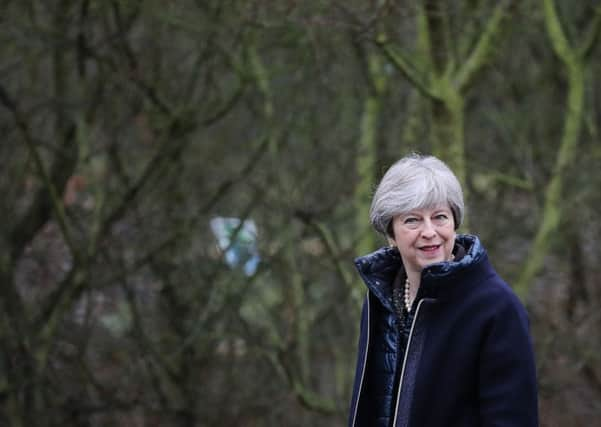'˜May's green plans must go hand in hand with productive farms'


Speaking alongside Environment Secretary Michael Gove, Prime Minister Theresa May announced details of the 150-page strategy during a speech in London yesterday.
She proposed extending the 5p carrier bag charge and encouraging plastic-free supermarket aisles.
Advertisement
Hide AdAdvertisement
Hide AdThe Prime Minister went on to state her intentions to further restrict the use of neonicotinoids; chemicals used by farmers that are linked with harming bees, and said that her government was devising a new environmental scheme for farmers that recognises the delivery by landowners of goods for the public.
Other aspects of the plan include supporting farmers to turn fields into meadows and kickstarting a Northern Forest project along a 120-mile stretch of the M62 corridor.
Farming groups are anxious over how any new green policy will allow farms, as well as the environment, to prosper and during her speech, Mrs May rejected as a “false choice” the suggestion that Britain must choose between economic growth or environmental protection.
Afterwards, Guy Smith, vice president of the National Farmers’ Union, said: “Over the past four decades, farmers have carried out a huge amount of work to encourage wildlife, as well as benefiting the landscape, soil and water and reducing their impact on the climate.
Advertisement
Hide AdAdvertisement
Hide Ad“Farming also offers innovative solutions to wider environmental challenges. For instance the Government’s current concern with plastics highlighted by the BBC’s brilliant Blue Planet series could be met with substituting synthetic plastics with farm produced biodegradable starch-based packaging.
“But there must be a coherent approach. British farming has a unique role in producing a safe, affordable and high quality supply of food as well as protecting, maintaining and enhancing 70 per cent of the nation’s iconic countryside. That only remains feasible, however, as long as farmers run sustainable and viable businesses.
“We provide the raw materials for a domestic food industry that employs 3.8m people and which, as the UK’s largest manufacturing sector, generates £112bn in value for the UK economy. This is why we welcomed the Secretary of State’s commitment last week to create a national food policy and his recognition that food is at the heart of viable farming businesses. It’s vital therefore that a holistic approach is taken and the environment plan must go hand-in-hand with a future food policy, where measures for protecting and enhancing the environment are joined up with policies to improve productivity and manage volatility to ensure that we have profitable, productive and progressive farm businesses post-Brexit.”
The Environment Plan includes a commitment to improve soil health, and restore and protect peatlands, including the development of a soil health index and ending the use of peat in horticulture.
Advertisement
Hide AdAdvertisement
Hide AdDr Rob Stoneman, chairman of the IUCN UK Peatland Programme and chief executive of Yorkshire Wildlife Trust, said: “A move away from the use of peat in horticulture must run alongside our important work to restore and conserve peatlands, so it is important that the Government remains signed up to phasing out peat use altogether by 2030
“Should voluntary measures not prove successful, it will be necessary to look at statutory measures and regulations, which could include a ban on peat or fiscal measures to ensure the use of peat is more expensive than using peat alternatives. Government commitment to consider these measures, should progress not have been made by 2020, will be essential.”
The Country Land and Business Association said farmers and landowners will play a crucial role in delivering the vision set out by the Prime Minister.
CLA director of policy Christopher Price said: “The plan acknowledges the range of ‘public goods’ that are delivered across our countryside.
Advertisement
Hide AdAdvertisement
Hide Ad“There is however much more work to be done to make these plans more specific and signal where the hard choices will be made. Much of what is proposed will require significant investment from a range of sources consistently delivered over decades.”
Wakefield MP Mary Creagh, who chairs the Parliamentary Environmental Audit Committee, called on the Government to pass a new Environmental Protection Act to make sure that environmental protections are maintained or enhanced after the UK leaves the EU.